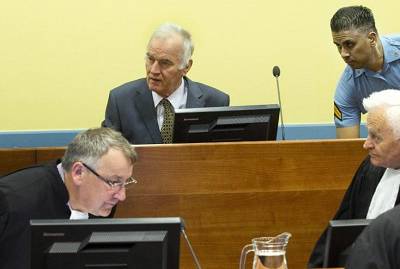Former Bosnian Serbian commander Ratko Mladic has been sentenced to life in prison, for genocide and war crimes during the Balkan conflict more than two decades ago.
The presiding judge of the International Criminal Tribunal for the former Yugoslavia (ICTY) on Wednesday found that the 74-year-old general "significantly contributed" to genocide committed at Srebrenica.
Previous judgments of the tribunal in the Netherlands already ruled that the massacre of about 8,000 Muslim men and boys in Srebrenica was genocide.
Judge Alphons Orie ruled that the perpetrators of the crimes committed in Srebrenica intended to destroy the Muslims living there.
He also ruled that Mladic carried out and personally oversaw a deadly campaign of sniping and shelling in Sarajevo.
"The crimes committed rank among the most heinous known to humankind," he said.
The former general initially appeared relaxed as he listened intently to the verdict, but was later removed from the courtroom after he shouted at the judges when he was refused an adjournment.
His lawyer said Mladic needed a break for treatment of high blood pressure, but the judge continued reading the verdict after Mladic's removal from court.
Wednesday's verdict was long awaited by tens of thousands of victims across former Yugoslavia, and dozens gathered early outside the courtroom, many clutching photos of loved ones who died or are among the 7,000 still missing.
The court said, however, it was "not convinced" of genocidal intent in six other municipalities, in line with previous judgments.
"We're sad and disappointed because Mladic wasn't declared responsible for the genocide in Prijedor and in the other five municipalities that were listed," Sejida Karabasic, from Prijedor, said.
"3,176 people [killed] in Prijedor isn't enough in order to prove that there was a mass killing. So, more than 10,000 of us should have been killed in order to prove that genocide happened there," Karabasic said.
"There were mass rapes, killings, concentration camps. They found the largest mass graves in the Prijedor region, none of that was enough for the verdict to include genocide."
Munir Habibovic, a Srebrenica resident, said he was satisfied with the punishment. "We weren't expecting anything less," he said, while agreeing that Mladic should have been found guilty of genocide in the six additional municipalities.
Speaking on behalf of the Association for Parents of Children Killed in Besieged Sarajevo, Fikret Grabovica told Al Jazeera that "no such punishment exists for Mladic to get what he deserves."
"But we can be a partly satisfied with this verdict. It's very important that he received a life sentence… what I'm particularly glad about is that the indictment confirmed the terrorising and sniping of the civil population of Sarajevo, in which 1,600 children were killed," Grabovica said.
Mladic, dubbed the "Butcher of Bosnia", was accused of 11 counts - including genocide, war crimes and crimes against humanity committed by his forces during the war in Bosnia from 1992 to 1995.
Many Bosnian Serbs, however, view Mladic as a national hero who helped Serbia through the war that broke up former Yugoslavia.
Serbian daily newspapers on Wednesday featured photos of Mladic on the front page with captions reading, "I'm innocent; they can't take my soul" and "I'm not guilty."
Al Jazeera's Marko Subotic, reporting from Serbia's capital, Belgrade, said support for Mladic there is still widespread.
"The media in Serbia never reported on what the Serbian army, under the command of Mladic, committed in Bosnia and Herzegovina. Because of this, researchers say residents are confused because they don't know why Mladic is standing trial at the tribunal in the Netherlands," Subotic said.
"A study in 2012 concluded that 42 percent of residents in Serbia don't know why Mladic is being tried at all. They know more about what went on while he was in hiding; they know that he was looking for strawberries when he was arrested in Serbia in 2011."
Mladic's trial was the last before the tribunal, and came as the court in The Hague prepared to close its doors next month.
PHOTO CAPTION
Former Bosnian Serb army commander Ratko Mladic attends his trial at the International Criminal Tribunal for the former Yugoslavia (ICTY) at The Hague May 16, 2012. REUTERS
Al-Jazeera


 Home
Home Discover Islam
Discover Islam Quran Recitations
Quran Recitations Lectures
Lectures
 Fatwa
Fatwa Articles
Articles Fiqh
Fiqh E-Books
E-Books Boys & Girls
Boys & Girls  Ramadan
Ramadan Fatwa Audios
Fatwa Audios Month of Mercy
Month of Mercy Women
Women Eed Al- Fitr
Eed Al- Fitr Food Recipes
Food Recipes Videos
Videos

 Prayer Times
Prayer Times












